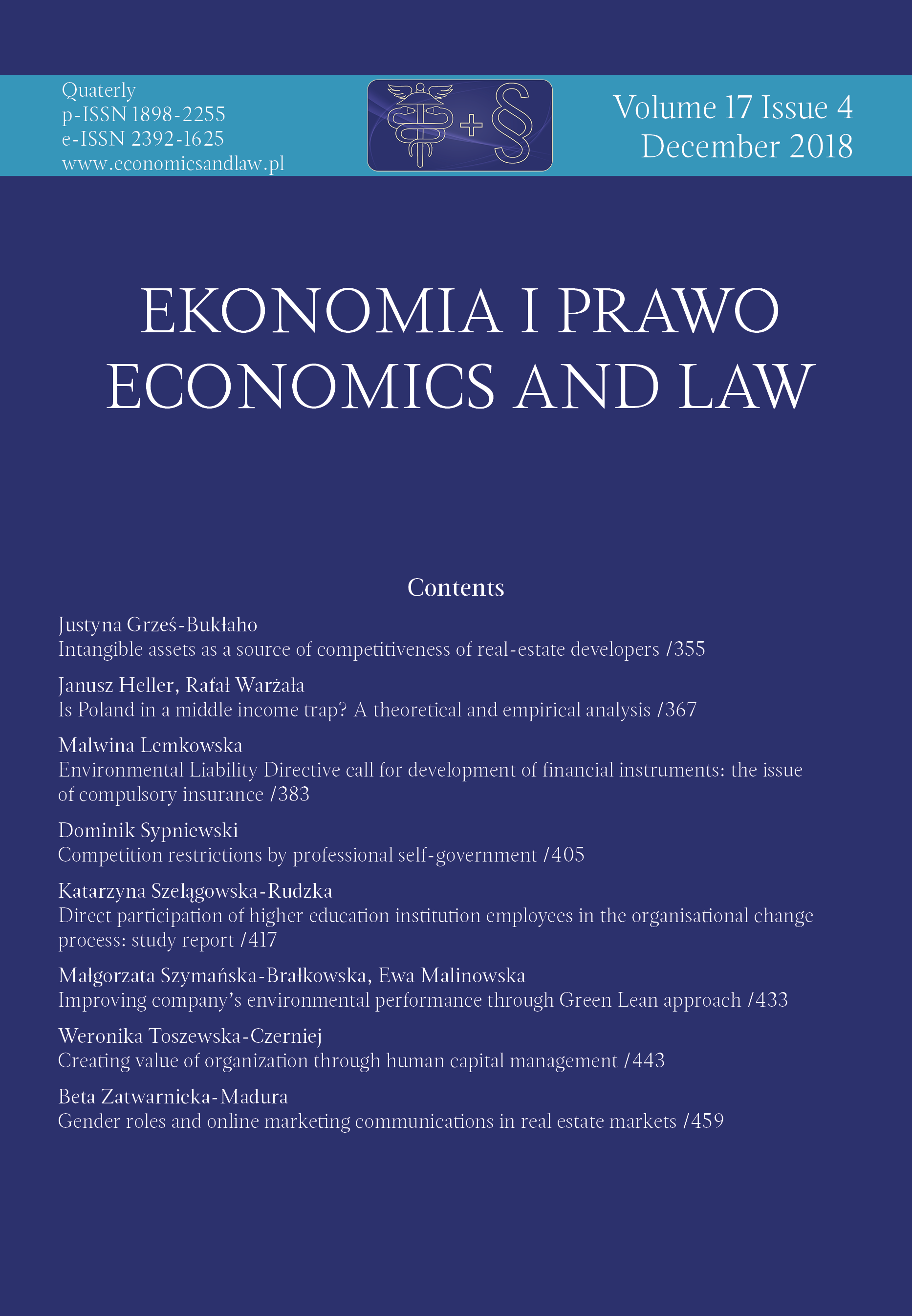Intangible assets as a source of competitiveness of real-estate developers
DOI:
https://doi.org/10.12775/EiP.2018.026Keywords
real-estate developers, residential market, competition, competitive advantage, enterprise resourcesAbstract
Motivation: resources of an enterprise are understood widely and include both tangible means as well as immaterial assets. Currently, there is an increasing emphasis on the importance of intangible resources in building the competitive advantage of an enterprise. Competitive advantage is identified with the status desired by an enterprise, which operates in a competitive environment. It can be defined as a disproportion among enterprises, which allows one company to compete better than others on the market. The purpose of the analysis is usually therefore to determine the sources of competitive advantage. The knowledge is particularly important for enterprises operating in the property development sector, which is characterized by a considerable volatility resulting from changes in the economic situation in the whole construction sector.
Aim: the purpose of the article is to answer the question of what factors are important in the process of building a competitive advantage of real-estate developers, in particular, what is the role of intangible resources.
Results: conclusions of the analysis made it possible to formulate a summary of intangible assets that contribute most to building a competitive advantage of real-estate developers. These factors were included in several areas, inter alia: enterprise market, relations, finances, product, human resources.
References
Archibugi, D., & Lundvall, B. (Eds.). (2001). The globalizing learning economy. Oxford: Oxford University Press.
Avril, B., & Roth, B. (2001). La promotion immobiliere. Construire pour autrui. Paris: Pressem de l’Ecole Nationale des Ponts et Chaussees.
Baran, M. (2014). Skuteczność utrzymywania przewagi konkurencyjnej przez liderów branży budowlanej w świetle kryzysu w otoczeniu gospodarczym. In M. Baran (Ed.), Poszukiwanie przewagi konkurencyjnej wybrane uwarunkowania. Kraków: UJ.
Barney, J. (1991). Firm resources and sustained competitive advantage. Journal of Management, 17(1). doi:10.1177/014920639101700108.
Barney, J. (2001). Resource-based theories of competitive advantage: a ten-year retrospective on the resource-based view. Journal of Management, 27(6). doi:10.1177/014920630102700602.
Bontis, N. (1998). Intellectual capital: an exploratory study that develops measures and models. Management Decision, 36(2). doi:10.1108/00251749810204142.
Bontis, N., Keow, W., & Richardson, S. (2000). Intellectual capital and business performance in Malaysian industries. Journal of Intellectual Capital, 1(1). doi:10.1108/14691930010324188.
Bozzolan, S., Favotto, F., & Ricceri, F. (2003). Italian annual intellectual capital disclosure: an empirical analysis. Journal of Intellectual Capital, 4(4). doi:10.1108/14691930310504554.
Brooking, A., Board, P., & Jones, S. (1998). The predictive potential of intellectual capital. International Journal of Technology Management, 16(1–3). doi:10.1504/IJTM.1998.002646.
D’Aveni, R., Dagnino, G., & Smith, K., (2010). The age of temporary advantage. Strategic Management Journal, 31(13). doi:10.1002/smj.897.
Dzinkowski, R., (2000). The measurement and management of intellectual capital: an introduction. Management Accounting, 78(2).
Edvinsson, L., & Malone, M.S. (2001). Kapitał intelektualny. Poznaj prawdziwą wartość swojego przedsiębiorstwa odnajdując jego ukrytą wartość. Warszawa: PWN.
Flak, O., & Głóg, G. (2009). Konkurencyjność przedsiębiorstwa: pojęcia, definicje, modele. Katowice: AE w Katowicach.
Goh, T., (2000). Intellectual capital: the new wealth of organizations. Personnel Review, 29(1). doi:10.1108/pr.2000.29.1.115.1.
Grant, R. (2002). The knowledge-based view of the firm. In C. Choo, & N. Bontis (Eds.), The strategic management of intellectual capital and organizational knowledge. New York: Oxford University Press.
Grześ-Bukłaho, J. (2015). Kształtowanie reputacji w procesie budowania przewagi konkurencyjnej przedsiębiorstw deweloperskich: podstawy teoretyczne i wyniki badań empirycznych. Białystok: Oficyna Wydawnicza Politechniki Białostockiej.
Kucharska-Stasiak, E. (2006). Nieruchomość w gospodarce rynkowej. Warszawa: PWN.
Leśniewski, M.A. (2015). Konkurencyjność miękka przedsiębiorstw. Warszawa: Difin.
Lev, B. (2001). Intangible: management, measurement, and reporting. Washington: Brooking Institution Press.
Low, J., & Kalafut, P.C. (2004). Niematerialna wartość firmy: ukryte źródła przewagi konkurencyjnej. Kraków: Oficyna Ekonomiczna.
Seifert, M., & Hadida, A.L. (2006). Facilitating talent selection decisions in the music industry. Management Decision, 44(6). doi:10.1108/00251740610673341.
Sveiby, K.E. (1997). The intangible asset monitor. Journal of Human Resources Costing and Accounting, 2(1). doi:10.1108/eb029036.
Urbanek, G. (2008). Wycena aktywów niematerialnych przedsiębiorstwa. Warszawa: PWE.
Wielgórka, D. (2012). Value management company in turbulent environment. Prague: Publish House Education and Science.
Downloads
Published
How to Cite
Issue
Section
Stats
Number of views and downloads: 681
Number of citations: 0
